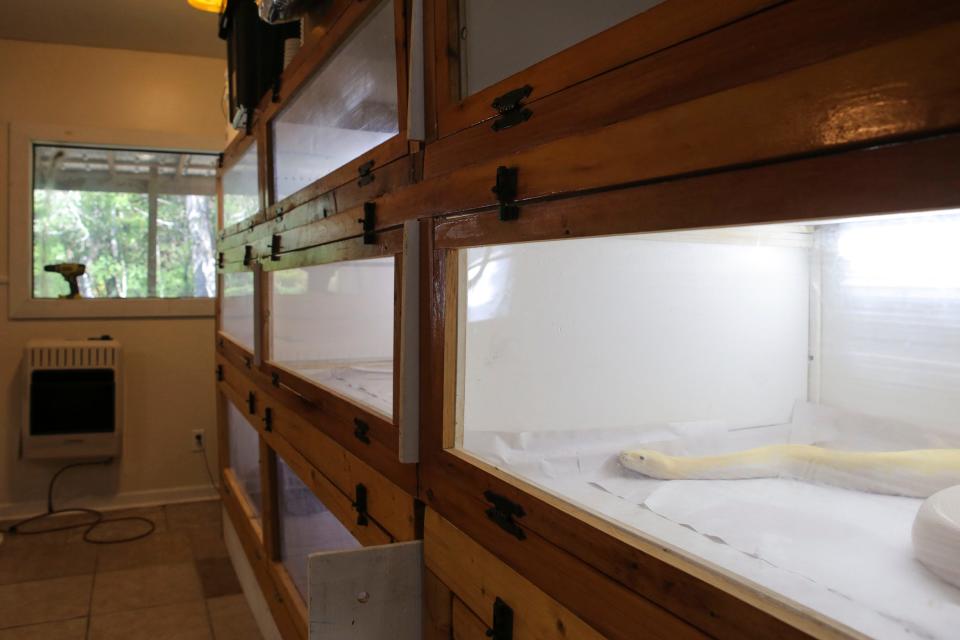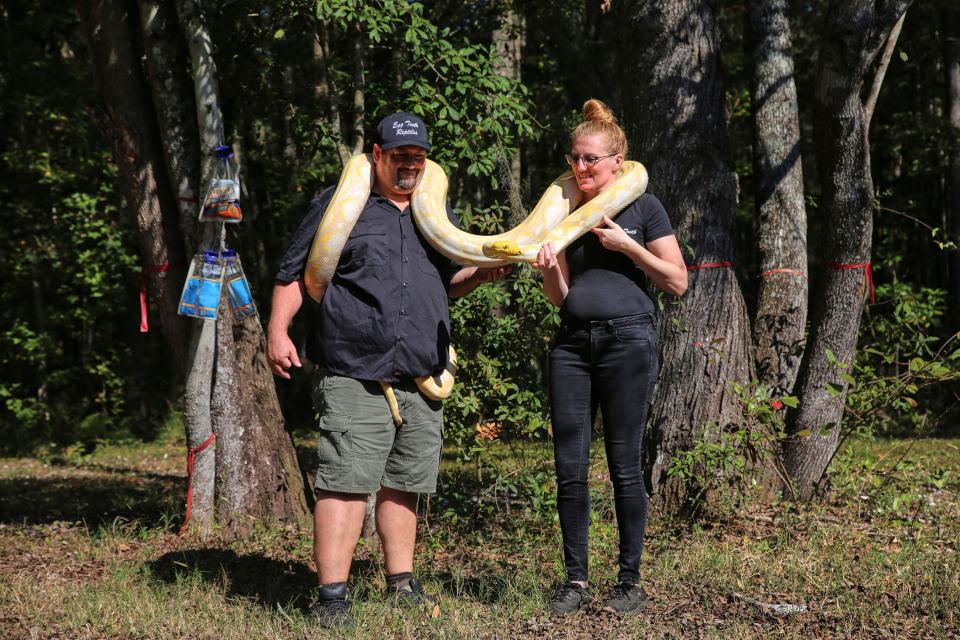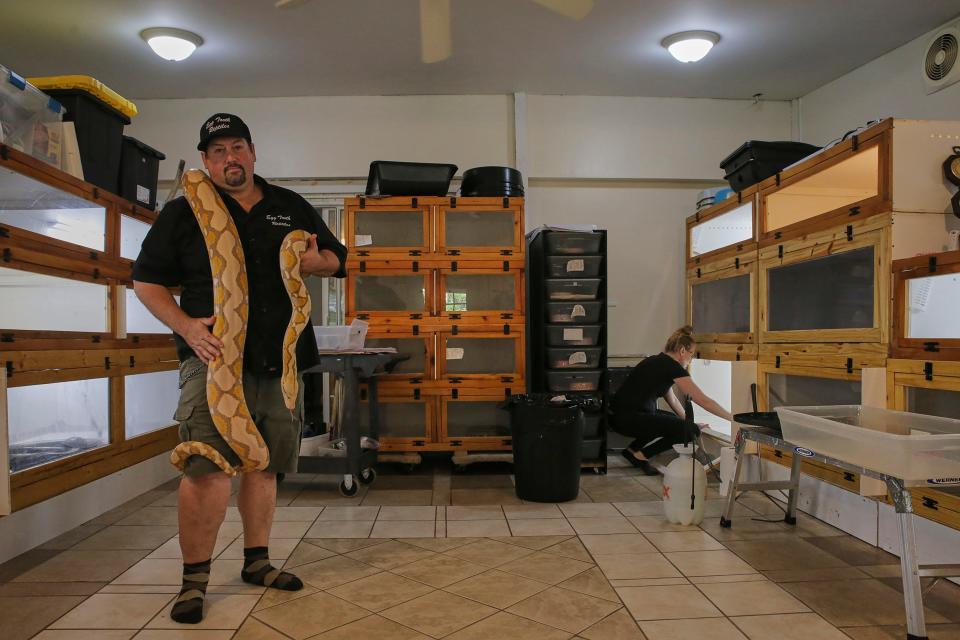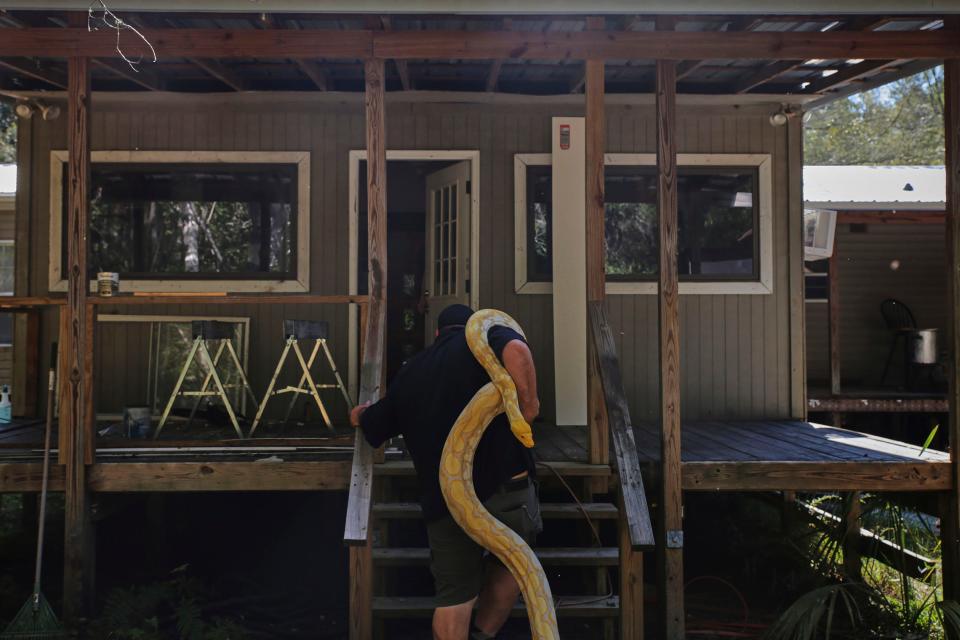Georgia DNR limits ownership and breeding of Burmese pythons, tegus and other reptiles
Some pythons and other reptiles seeking a home in Georgia will need to look elsewhere.
A controversy is brewing for reptile breeders and lovers after the Georgia Department of Natural Resources updated its wild animals list for the first time since the mid-1990s.
The list includes animals not allowed for importation, transportation, sale, transfer or possession due to their potential dangers and capacity to become a disruptive species.
Invasive species in Georgia: Hog wild: Even with development looming, feral swine likely here to stay in Georgetown
Native plants: Ditching the grass: Savannah gardener 're-wilds' yard with native plants
Burmese pythons and Argentine white and black tegus were named as animals that Georgians must stop breeding and buying. The list also includes other reptiles as well as aquatic species, and critters like the marbled crayfish that have high potential to harm their native counterparts.
People who currently own these animals do not have to get rid of their pets. But they have 12 months to tag and register them with DNR.
For more information on the rule changes and a list of all the impacted animals, visit bit.ly/3NzPaOB.

Invasive down south
In the Everglades, the non-native Burmese pythons, which can grow beyond 16 feet in the wild, have been colossally disruptive to the environment. Populations are exploding in south Florida and they out-compete native wildlife for food and resources.
It's not a new issue. According to the U.S. Geological Survey, a 2012 study linked species decline in Everglades National Park to Burmese pythons. Since 1997, the agency said raccoon populations had dropped by 99.3%; opossums by 98.9%; and, bobcats by 87.5%, while marsh rabbits, cottontail rabbits and foxes "effectively disappeared."
Bones with a story: Ancient bison bones dug up in Georgia unveil climate conditions from 50,000 years ago
On the rise: Georgia's record breaking sea turtle nesting season winds to a close
"Invasive species cost billions of dollars of damage to the economy" beyond the ecological devastation they can bring, said Brett Albanese, assistant chief with DNR's Wildlife Conservation Section. "The trick is that once something becomes established, it's really hard to eradicate, so we are trying to be more proactive."
Another factor in their decision is the snake's ability to harbor an invasive parasite, the lungworm, that can spread to native snakes.
The rule-change puts Georgia in line with multiple neighboring states with similar policies, such as Alabama and Florida.

Part of the family
John McHugh and Michelle Watts are relatively new to Georgia, along with their menagerie of reptiles.
Based in Brunswick, the reptile breeders moved up from Florida last year after Florida restricted ownership and breeding of Burmese pythons, McHugh and Watt's specialty, in April 2021.
Despite the financial toll, they uprooted their lives and moved to Georgia quickly to avoid selling or euthanizing their snakes.
The two spoke out — Watts in tears — against the rule change at a Richmond Hill DNR board meeting in October, arguing that the policy was unnecessarily restrictive and only punishes responsible breeders and owners.

"We are already inspected by the Department of Agriculture, with surprise inspections," McHugh said. "We keep track of everything that's born, everything that dies. We keep the names and addresses of every person we buy from or sell to."
Moreover, McHugh said that captive-bred snakes don't carry the parasitic worm.
"We're just trying to make a living and do what we would like to do," Watts said.
McHugh and Watts want the DNR to consider permitting, like a fishing license, to track where people are adopting snakes. But whether or not this is feasible for the DNR, given its funding and workforce, is unclear.
"Now you're going to have a bunch of unregulated animals bought and sold," McHugh said regarding the possible outcome of the rule change.

Cold on the coast
Albanese said there's uncertainty about whether pythons could survive and establish themselves in Georgia. But with the climate warming up, DNR is taking a cautious approach.
Whit Gibbons, a herpetologist at the University of Georgia's Savannah River Ecology Lab, said that the jury is out on what would happen if Burmese pythons made their way to the wilds of Georgia. There are two limiting factors he said would make it unlikely for the snakes to establish themselves.
"The difference between most of Georgia and the Everglades is that there is plenty of food for them in the Everglades," Gibbons said. Released anywhere in Georgia, Gibbons said Burmese pythons would run out of food sources.
Invasive species: A new kind of tick has made its way to north Georgia. Here's what you need to know
Not endangered: Georgia gopher tortoises skirt endangered status citing steady conservation
An individual snake could probably last a year or so in Georgia, surely through the warm parts of the year anywhere in the state. But come wintertime, Gibbons said the snakes probably won't survive in most parts of Georgia.
UGA did a study where they kept some large pythons in an outdoor enclosure during the winter, and none of them survived. While a python could last most of the year, Gibbons said it's not likely in Georgia it could reproduce, last the winter or establish a large population.
Albanese said snakes could enter human-made structures, or stay down in burrows and saltwater marshes to last the winter. But rather than testing this theory, Georgia DNR is opting for the more protective route.
Correction: a previous version of this story stated the reticulated python was included in this policy change.
Marisa Mecke is an environmental journalist. She can be reached at mmecke@gannett.com or by phone at (912) 328-4411.
This article originally appeared on Savannah Morning News: Georgia bans ownership, breeding of Burmese, tegu

